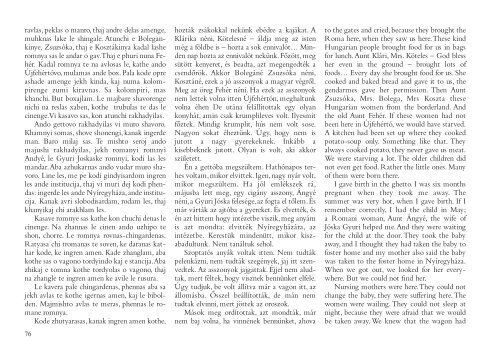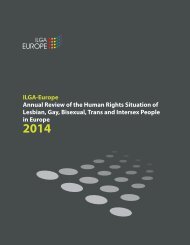Create successful ePaper yourself
Turn your PDF publications into a flip-book with our unique Google optimized e-Paper software.
avlas, peklas o manro, thaj andre delas amenge,<br />
muhknas lake le shingale. Atunchi e Bolegan -<br />
kinye, Zsuzsóka, thaj e Kosztákinya kadal lashe<br />
romnya sas le andar o gav. Thaj e phuri nuna Fe -<br />
hér. Kadal romnya te na avlosas le, kathe ando<br />
Újfehértóvo, mulamas ande box. Pala ko de opre<br />
ashade amenge jekh kinda, kaj numa kolompirenge<br />
zumi kiravnas. Sa kolompiri, mas<br />
khanchi. But boxajlam. Le majbare shavo renge<br />
nichi na reslas xaben, kothe trubulas te das le<br />
cinenge. Vi kasavo sas, kon atunchi rakha dyilas.<br />
Ando gettovo rakhadyilas vi muro shavoro.<br />
Khamnyi somas, shove shonengi, kanak ingerde<br />
man. Baro milaj sas. Te mishto seroj ando<br />
majushi rakhadyilas, jekh romanyi romnyi<br />
Andyé, le Gyuri Joskaske romnyi, kodi las les<br />
mandar. Aba azhukarnas ando vudar muro shavoro.<br />
Line les, me pe kodi gindyisardom ingren<br />
les ande institucija, thaj vi muri dej kodi phendas:<br />
ingerde les ande Nyíregyháza, ande institucija.<br />
Kanak avri slobodisardam, rodam les, thaj<br />
khanyikaj chi arakhlam les.<br />
Kasave romnye sas kathe kon chuchi denas le<br />
cinenge. Na zhannas le cinen ando uzhipo te<br />
shon, chorre. Le romnya rovnas-chingardenas.<br />
Ratyasa chi tromanas te soven, ke daranas kat -<br />
har kode, ke ingren amen. Kade zhanglam, aba<br />
kothe sas o vagono tordyindo kaj e stancija. Aba<br />
zhikaj e tomna kothe tordyolas o vagono, thaj<br />
na zhangle te ingren amen ke avile le ru sura.<br />
Le kavera pale chingardenas, phennas aba sa<br />
jekh avlas te kothe igernas amen, kaj le bibol -<br />
den. Majmishto avlas te meras, phennas le ro -<br />
mane romnya.<br />
Kode zhutyarasas, kanak ingren amen kot he,<br />
76<br />
hozták zsákokkal nekünk ebédre a kajákat. A<br />
Klárika néni, Kötelesné – áldja meg az isten<br />
még a földbe is – hozta a sok ennivalót… Min -<br />
den nap hozta az ennivalót nekünk. Fôzött, meg<br />
sütött kenyeret, és beadta, azt megen ged ték a<br />
csendôrök. Akkor Bolegáné Zsuzsóka néni,<br />
Kosztáné, ezek a jó asszonyok a magyar végrôl.<br />
Meg az öreg Fehér néni. Ha ezek az asszonyok<br />
nem lettek volna itten Újfehértón, meghaltunk<br />
volna éhen De utána felállítottak egy olyan<br />
konyhát, amin csak krumplileves volt. Ilyesmit<br />
fôztek. Mindig krumplit, hús nem volt sose.<br />
Nagyon sokat éheztünk. Úgy, hogy nem is<br />
jutott a nagy gyerekeknek. Inkább a<br />
kisebbeknek jutott. Olyan is volt, aki akkor<br />
született.<br />
Én a gettóba megszültem. Hathónapos terhes<br />
voltam, mikor elvittek. Igen, nagy nyár volt,<br />
mikor megszültem. Ha jól emlékszek rá,<br />
májusba lett meg, egy cigány asszony, Ángyé<br />
néni, a Gyuri Jóska felesége, az fogta el tôlem. És<br />
már várták az ajtóba a gyereket. És elvették, és<br />
én azt hittem hogy intézetbe viszik, meg anyám<br />
is azt mondta: elvitték Nyíregyházára, az<br />
intézetbe. Kerestük mindenütt, mikor kiszabadultunk.<br />
Nem tanáltuk sehol.<br />
Szoptatós anyák voltak itten. Nem tudták<br />
pelenkázni, nem tudták szegények, jaj itt szen -<br />
vedtek. Az asszonyok jajgattak. Éjjel nem aludtak,<br />
mert féltek, hogy visznek bennünket elfele.<br />
Úgy tudjuk, be volt állítva már a vagon itt, az<br />
állomásba. Ôsszel beállították, de mán nem<br />
tudtak elvinni, mert jöttek az oroszok.<br />
Mások meg ordítottak, azt mondták, már<br />
nem baj volna, ha vinnének bennünket, ahova<br />
to the gates and cried, because they brought the<br />
Roma here, when they saw us here. These kind<br />
Hungarian people brought food for us in bags<br />
for lunch. Aunt Klári, Mrs. Köteles – God bless<br />
her even in the ground – brought lots of<br />
foods… Every day she brought food for us. She<br />
cooked and baked bread and gave it to us, the<br />
gendarmes gave her permission. Then Aunt<br />
Zsuzsóka, Mrs. Bolega, Mrs Koszta these<br />
Hungarian women from the borderland. And<br />
the old Aunt Fehér. If these women had not<br />
been here in Újfehértó, we would have starved.<br />
A kitchen had been set up where they cooked<br />
potato-soup only. Something like that. They<br />
always cooked potato, they never gave us meat.<br />
We were starving a lot. The older child ren did<br />
not even get food. Rather the little ones. Many<br />
of them were born there.<br />
I gave birth in the ghetto. I was six months<br />
pregnant when they took me away. The<br />
summer was very hot, when I gave birth. If I<br />
remember correctly, I had the child in May;<br />
a Romani woman, Aunt Ángyé, the wife of<br />
Jóska Gyuri helped me. And they were waiting<br />
for the child at the door. They took the baby<br />
away, and I thought they had taken the baby to<br />
foster home and my mother also said the baby<br />
was taken to the foster home in Nyíregyháza.<br />
When we got out, we looked for her everywhere.<br />
But we could not find her.<br />
Nursing mothers were here. They could not<br />
change the baby, they were suffering here. The<br />
women were wailing. They could not sleep at<br />
night, because they were afraid that we would<br />
be taken away. We knew that the wagon had



